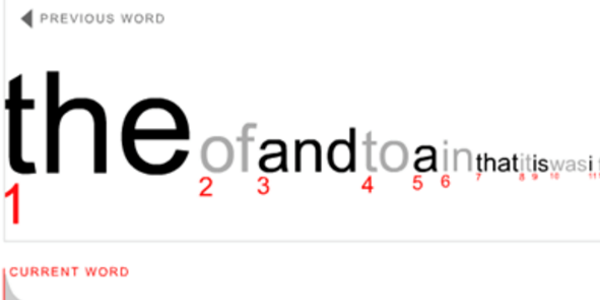The New York Times averages 4.9 characters
An editor once counseled me to change all the instances of employment in an article to jobs.

Great advice. More than 80 years of readability research demonstrate that short, simple, familiar words are easiest to read and understand.
So if short words are better, how long should your words be?
If you’re writing in English, keep them to five characters on average.
This is important. Because short words are the No. 1 predictor of readability.
Write like The Times.
When I recommend to my clients that they limit their word length to five characters per word, they roll their eyes.
But when I tell them I know they can do it, because The New York Times does it every day, they sit up and take note.
We analyzed all stories in one edition of The New York Times. (We skipped the sports pages, thinking they might skew our results.) On that day, Times words:
- Ranged from an average of 4 characters per word (“Seeing the World Through Its Barbecue Joints“) to an average of 5.6 characters (“Wright Architecture School Sets Fund-raising Goal for Independence”).
- Averaged 4.9 characters per word.
- Weighed in at a median of 4.9 characters per word.
And, remember, the Times is covering topics ranging from rocket science and brain surgery.
What’s your average word length? Could you make big stories more accessible to more people if it were shorter?
Benchmark your word length against the best.
Need more evidence?
- The Wall Street Journal averages 4.8 characters per word. And that’s covering the most complex machinations of business.
- The BBC averages 4.7 characters per word. And that’s covering global news. (Benchmark your copy against telecomm and other trades.)
- The average word in the English language is 4.7 characters. Can you keep your average word length to 4.7 characters?
- Words of more than two syllables are hard words, according to the Gunning-Mueller Fog Index. The SMOG (Simple Measure of Gobbledygook) index agrees. Can you write, on average, in easy words?
- Of the 235 words in the Gettysburg Address (that’s fewer than the number on the back of a potato chip package today), 174 of them have only one syllable.
- Winston Churchill entertained himself by writing essays of one-syllable words. (And he’s the only person, as far as I know, who ever slayed Nazis with his words.) The man won a Nobel Laureate for literature for his writing.
Two syllables? One? 4.7 characters?
Why so short?
Why so short?
The words we use most often in the English language are Anglo-Saxon. And most of those are single-syllable words: the, of, and, to, a, in, that, it, is, was, I and so on.

In fact, the 54 most-used words in the English language have just one syllable, according to WordCount, a website that chronicles how we use language. “About” comes in 55th, followed by even more one-syllable words. These super-short words make it possible to keep your overall average short.
And short words serve you, your audience and your organization better. Why not use them?
How to keep words short.
How do you keep your words within these character limits? Open your Microsoft Word document, and start using the word count tool.
Don’t use Microsoft Word? An online character count tool or other character counter will work just as well to help you find your word and character count.
At this point, you’re not worrying about keyword density, keeping your message under 280 characters or hitting any particular number of words in an article. You’re not counting words, you’re making sure the number of characters per word hits the target.
Once your online word counter tool says you’ve hit the mark, you can move onto online tools for SEO.
Learn other ways to keep words short.

Leave a Reply